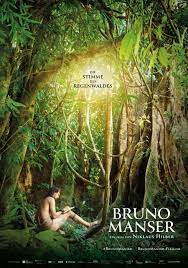
PARADISE WAR: THE STORY OF BRUNO MANSER/ DIE STIMME DES REGENWALDES.
Sweden, 2019, 122 minutes, Colour.
Sven Schelker, Nick Keleslau, Elizabeth Ballang, Mullane, Matthew Crowley, David K.S. Tse, Benjamin Mathis.
Directed by Nicklaus Hilber.
A film to be recommended, a film about environmental issues on a local scale, on a world scale. It is the story of Bruno Manser, a Swiss activist, rebellious in his young days, in prison at 19, following Gandhi’s nonviolence principles, studious, visiting Malaysia and Indonesia, deciding to try to find the nomadic tribes, the Penan, in the jungles of Sarawak, finding them, accepted by them (a scene reminiscent of Jeremy Irons in The Mission, playing a recorder/flute), joining them completely in their hunting (some humour at his learning), dress, moving around, details of their way of life, and the attraction of the young girl, Ubung. But he also wears his glasses and spends a great deal of his time writing in his notebooks (well illustrated and later published).
The opening of the posting in Wikipedia about him as helpful as background:
Bruno Manser (25 August 1954 – presumed dead 10 March 2005) was a Swiss environmentalist and human rights activist. From 1984 to 1990, he stayed with the Penan tribe in Sarawak, Malaysia, organising several blockades against timber companies. After he emerged from the forests in 1990, he engaged in public activism for rainforest preservation and the human rights of indigenous peoples, especially the Penan, which brought him into conflict with the Malaysian government. He also founded the Swiss non-governmental organization (NGO) Bruno Manser Fonds in 1991. Manser disappeared during his last journey to Sarawak in May 2000 and is presumed dead.
He finds the Penan in 1984 and experiences the inroads of logging industries, the incursions into the jungle, the demolition of the trees, the wasted open spaces. Working with the various nomad tribes who are being driven back into the forest, losing the animals for food, he organises protests, non-violent, barriers on the road, confrontations with the drivers, with the bosses, with the police, condemned by the local governments and authorities in Malaysia (denounced and ridiculed by Prime Minister Mahathir Mohamad). This goes on for a long while, assisted by the media who publicise his story – but the criticism of a middle-class white man coming in as a saviour for local tribes.
The government supported the logging, and also of incorporating the nomads into settlements, including the young woman, Ubung. Ultimately, Manser returns to Europe, spends many years organising protests against logging, demonstrating, hanging huge posters from buildings, interviews with officials of trade, a meeting with UN Secretary General, Boutros Boutros-Ghali, achieving some aims, but not preventing the settlements and the modernising of the nomads.
Eventually, Manser returns to Malaysia, meets the older Along Sega, who had accepted him and had become a father figure. He also encounters Ubung, now married with a child, adapted to the settlement. He is still pursued – escaping from the authorities, but lost in the jungle, never found.
Manser made a documentary, SAGO, 1997 and several documentaries also made about him.
- Audience knowledge of Bruno Manser? This film providing his life story, his work, his character, his ambitions, his campaigns?
- The narrative filling in his background, Switzerland, his parents, their criticisms of him, the later scenes of his parents when he returned to Switzerland, his devoted mother, his critical father? His coming to Sarawak, searching for the Penan, the trek through the mountains, writing in his notebooks, always wearing his glasses, finding the tribe, watching them hunt, the lifestyle, family, on the move, his playing the flute, the music, his being accepted, joining them, dressed like them, the scenes of learning to hunt, the boar, this celebrating his success, Along Sega as his father figure and friend?
- 1984, logging, in the jungles, the felling of the trees, the processes for logging, the companies, the workers, the drivers? The encroachment on the nomads hunting lands? Business, government, police?
- Bruno, the plan of protest, non-violent, the barriers on the roads, the confrontation with the drivers, the threats, government officials, the police? Over a long period?
- The journalist, supporting Bruno, the media arriving, the interviews, television coverage? Praise? Criticism of him as a middle-class white man? The journalist ultimately selling out, the government of the companies and their payments?
- Bruno as part of the nomad tribes, the sequence of the snake biting him and his cutting his wound, healing?
- The buildup to the confrontations, the offers of money, his refusal, the confrontations, the police, withdrawing, returning, the potential for violence?
- Bruno, the authorities, his being expelled? Returning to Switzerland?
- The 1990s, his return, with his family, with those in the office, the protests, the foundation, the hard work, appeals, protests and the hanging of the banner, the interview with the trade chief, going to New York, the UN, Boutros Boutros-Ghali and the support?
- Gradual progress against logging? But the disappointment about the settlement of the nomads, the arguments that nomad tribes should be modernised, “civilised”?
- His return to Sarawak, the reunion with Along Sega, Bruno’s disappearance, never found?
- An interesting film, a reminder of the campaigns from the 1980s and environmental awareness, anti-logging…?